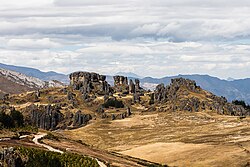Department of Cajamarca
This article needs additional citations for verification. (July 2017) |
Cajamarca
| |
|---|---|
 Stone forest of Cumbemayo | |
| Anthem: Anthem of Cajamarca Region | |
 Location of Cajamarca in Peru | |
| Coordinates: 6°37′S 78°47′W / 6.61°S 78.78°W | |
| Country | |
| Subdivisions | 13 provinces and 127 districts |
| Largest city | Cajamarca |
| Capital | Cajamarca |
| Government | |
| • Governor | Roger Guevara (2023–present) |
| Area | |
• Total | 33,317.54 km2 (12,863.97 sq mi) |
| Highest elevation | 4,496 m (14,751 ft) |
| Lowest elevation | 420 m (1,380 ft) |
| Population (2017) | |
• Total | 1,341,012 |
| • Density | 40/km2 (100/sq mi) |
| UBIGEO | 06 |
| Dialing code | 076 |
| ISO 3166 code | PE-CAJ |
| Website | www.regioncajamarca.gob.pe |
Cajamarca (Spanish pronunciation: [kaxaˈmaɾka]; Quechua: Kashamarka; Aymara: Qajamarka) is a department and region in Peru. The capital is the city of Cajamarca. It is located in the north part of the country and shares a border with Ecuador. The city has an elevation of 2,700 metres (8,900 ft) above sea level in the Andes Mountain Range, the longest mountain range in the world. Part of its territory includes the Amazon Rainforest, the largest in the world.
History
[edit]The oldest known irrigation canals in the Americas are located in the Nanchoc District of Cajamarca Department. The canals in the Zaña Valley have been radiocarbon dated to 3400 BCE, and possibly date to 4700 BCE.[1] From the 6th to the 10th century the people of the Wari culture ruled earlier cultures in the highlands. They established the administrative center of Wiraquchapampa.
In the 15th century, the Incas conquered the territory, expanding their empire. They established their regional capital in what is now Cajamarca. The Incas in 1465 established a new province there to serve as a bridge to their later conquests.[citation needed]
Cajamarca had long been one of the oldest cities in South America when the Spanish arrived in their conquest of Peru.[citation needed]
Political division
[edit]The Region is divided into 13 provinces.
Province (Capital)
- Cajabamba (Cajabamba)
- Cajamarca (Cajamarca)
- Celendín (Celendín)
- Chota (Chota)
- Contumazá (Contumazá)
- Cutervo (Cutervo)
- Hualgayoc (Bambamarca)
- Jaén (Jaén)
- San Ignacio (San Ignacio)
- San Marcos (San Marcos)
- San Miguel (San Miguel de Pallaques)
- San Pablo (San Pablo)
- Santa Cruz (Santa Cruz de Succhubamba)
Places of interest
[edit]Notable people
[edit]- Maxima Acuña, winner of the 2016 Goldman Environmental Prize
- Yma Sumac, notable exotica singer of the 1950s
- Pedro Castillo, President of Peru (2021–2022)
References
[edit]- ^ Dillehay, Tom D.; Eling, Herbert H. Jr.; Rossen, Jack (2005). "Preceramic irrigation canals in the Peruvian Andes" (PDF). Proceedings of the National Academy of Sciences of the United States of America. 102 (47). National Academy of Science: 17241–17244. doi:10.1073/pnas.0508583102. PMC 1288011. PMID 16284247. Retrieved 20 November 2020.


